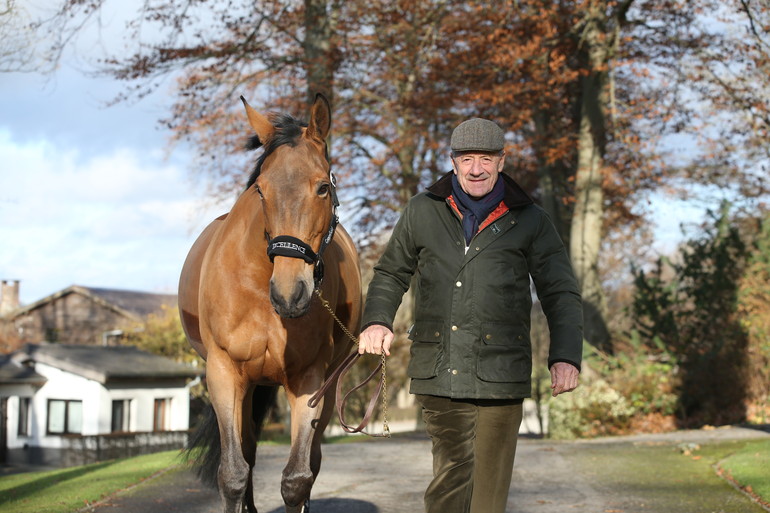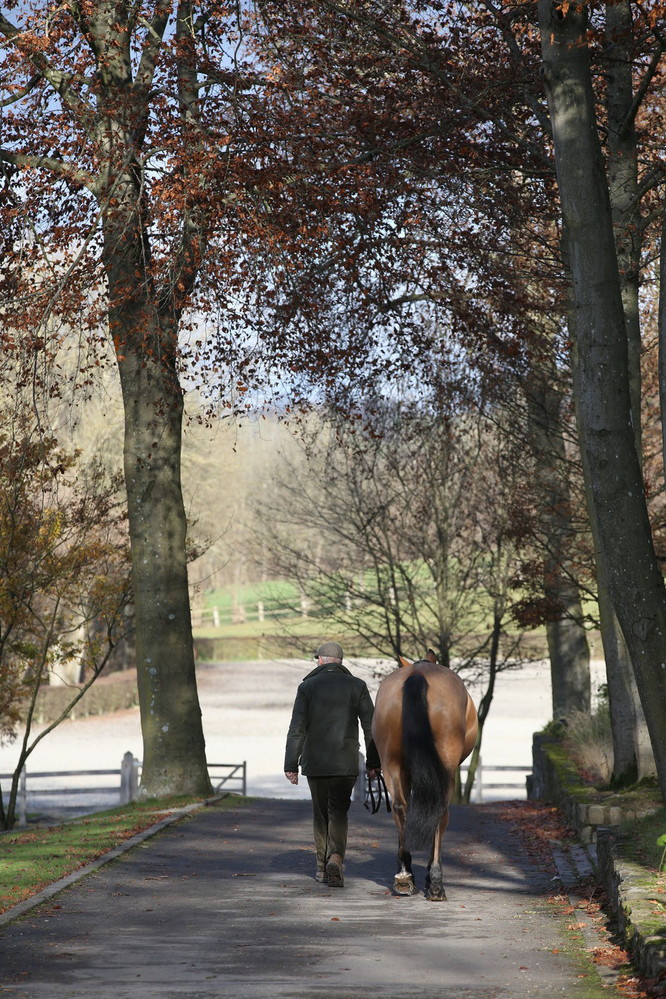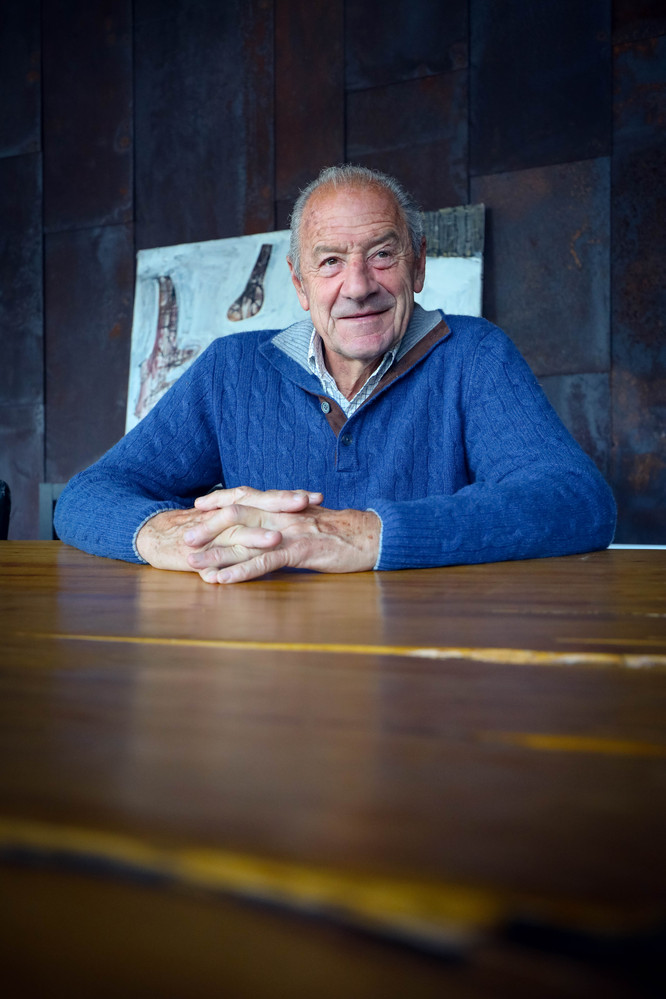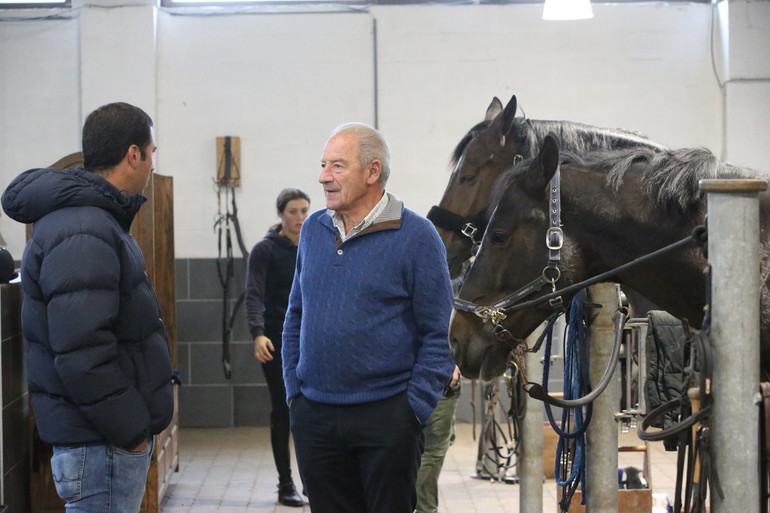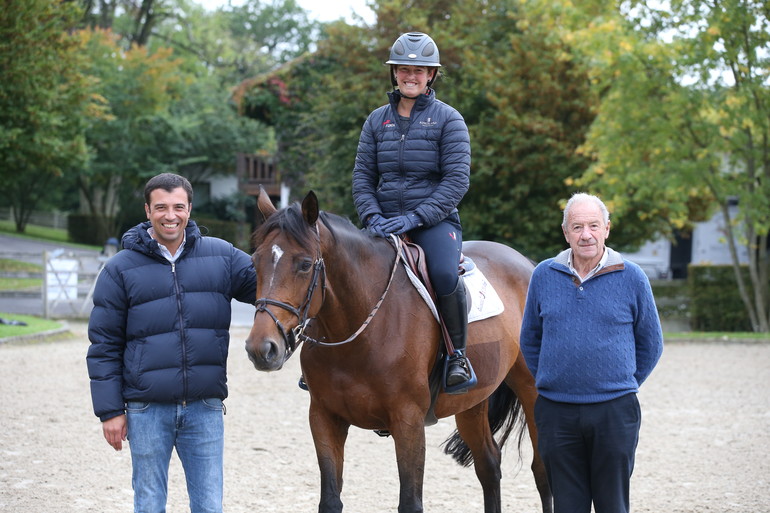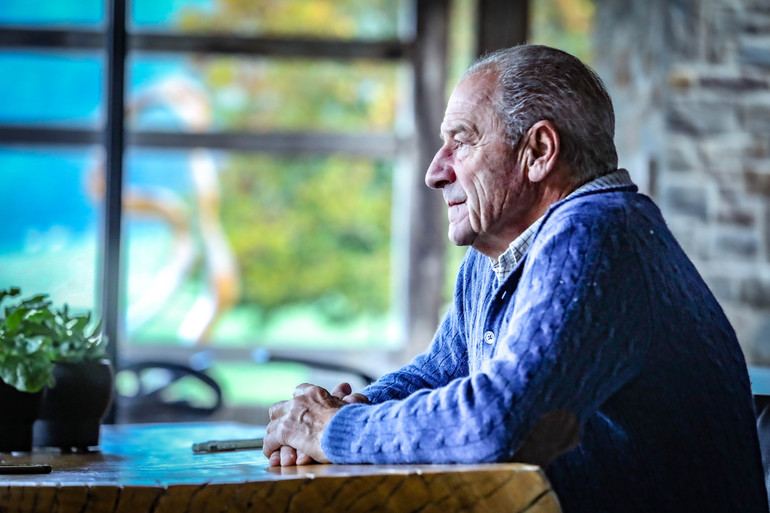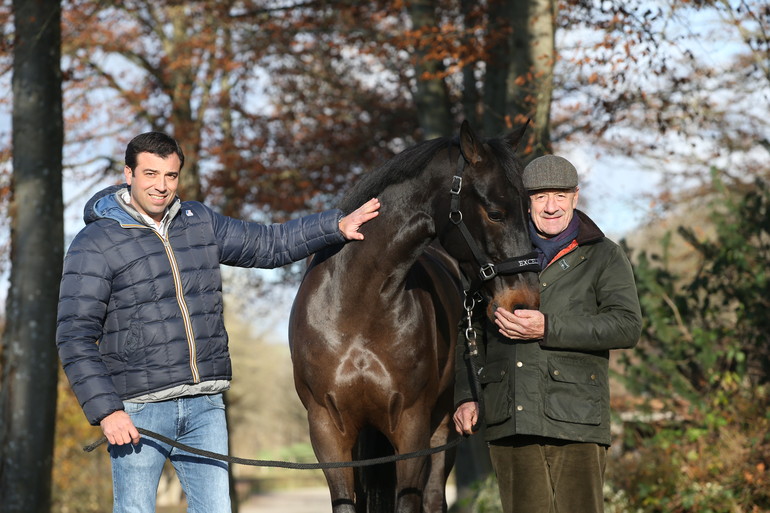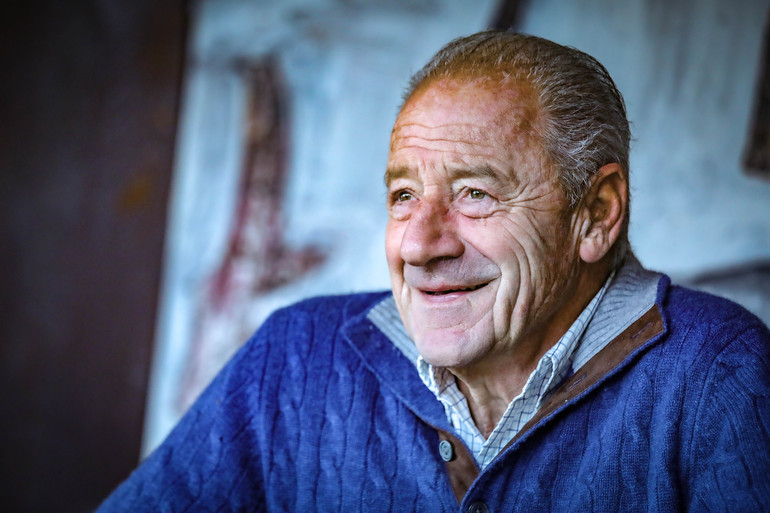Text © World of Showjumping
For decades, François Mathy has made sure to work in a way that has earned him the reputation as a man of his word. “When I say something, I try to tell what I believe and not exaggerate – and I think that is why people have confidence in me,” the Belgian horseman – a legend in his own right – tells World of Showjumping.
For the love of horses
The 77-year-old inherited his love for horses and passion for buying and selling from his father. “My parents, especially my father, loved horses,” François begins. “Since I was a kid, I have always loved animals, all species. When I was young, my father loved to go out in the woods with the horses and we followed him as a family – we all went together. We lived in Liege and came up here during the weekends to ride,” François says, behind him the stunning view from Ecurie Mathy in Aywaille, overlooking the hills surrounding Liege. “I always liked riding and just before I turned 18, I started to jump.”
I always liked the business, the buying and selling
“We bought a few horses and started to go to the local, rural shows,” François continues to tell about the beginning of his career. “At this time, I had quite a nice horse, who was very quick, and we won some classes. I started to enjoy that, but very soon understood that if I wanted to get better horses, I needed to make it a business and sell some of them. Trying to sell the horse I had and buy a better one, is how my business started.”
“I always liked the business, the buying and selling. It came easy to me and I enjoyed it, as well as competing and developing the horses. Buying a green horse and seeing it grow into a Grand Prix horse was always my pleasure. Back then, Belgians mostly bought horses outside the country. There was not so much breeding in Belgium at the time and the sport was not as developed as it is today. However, I thought we had good horses in Belgium too, and wanted to sell them to the neighbouring countries. Therefore, I started to do some business with Alwin Schokemöhle, who became a good friend of mine. From there, the business changed and grew rapidly, as did the competition aspect as I started to jump international shows – and I had some nice results.”
Gai Luron
François competed at the 1972 Olympic Games in Munich, and a few years later wrote his name into the history books by winning two bronze medals at the 1976 Olympic Games in Montreal with Gai Luron – an achievement that to this day remains unmatched in Belgium. “Gai Luron was one of the few horses I did not intend to sell,” François recalls. “Initially, I sold him when he was six, but then I bought him back one year later. He was only eight when we jumped the Olympics in Montreal. Afterwards, he unfortunately got injured and finished his career too early.”
My business was more important for me than the sport
“I had many nice horses, but I always sold them,” François continues. “I never kept a horse very long, because every time they started to go well, I would sell, buy another one and start the process again. My business was more important for me than the sport. I was lucky in Montreal; I had a good horse. It was a nice result, and after 1976 the business in Belgium – as well as the sport – started to grow. The business opened up a lot; all of the sudden there were more events, more breeding, more horses.”
Three types of horse people
“I always say that there are three types of horse people,” François smiles. “We have the breeders, the people who produce the young horses and the riders who use them in a competition, for the big shows. And I believe it is nearly impossible to mix these three groups. The good riders, they like to win, to ride fast; for the young horses you need patience, you need to be quiet, the education needs to go slow; and the breeders need a lot of patience too, they have to enjoy the whole process.”
My pleasure is to discover and develop horses
“I could not be a breeder, I have no patience for it,” François continues. “Breeding is a long process; it is like planting a tree in the forest – you need to wait for a long time for it to grow. You need patience to work with horses, but the patience needed for breeding is exceptional – and I don’t have that. Before you see the result of breeding, six to seven years have passed. I am not this patient, and when I can sell, I sell. I prefer this; my pleasure is to discover and develop horses.”
Maximize quality, minimize doubt
“As much quality as possible,” François answers when asked what he looks for when scouting horses. “Quality in a horse is mostly about their sensitivity. When you buy a horse, you never get 100% – that does not exist. In my opinion, you can never be totally sure about a horse. You need to try and have as little as possible of the feeling ‘maybe’. If you believe a horse has 70-80% of positive qualities, then you should go for it – but never expect to find one where you have 100%. It is very difficult to see a young horse and say ‘this horse will be a super star’. You can have an idea, you might see something, you can dream – but in any case, nothing is sure with horses. Many things can change, many things can make or break a good horse – and a rider is one of those affecting factors.”
“There are many riders, a lot of buyers, but also many sellers,” François tells about today’s market, which he says is very, very strong. “With a lot of breeding and many new countries coming into the sport, it is a huge business, but there are also many people trying to benefit from it. The scene has changed hugely since I first started. Back then, it was harder to know all the facts and you simply needed to trust people and what they said. Now, with your phone, you can check every result around the world. You can get in contact easily and it makes the market more open.”
To make a horse ready for the biggest classes, you need a good rider, shows and most importantly; time
“The biggest challenge is that to do the business, you need either a good horse or a good customer – one of the two,” François tells about the particularities of dealing with horses. “A good horse you can sell to anyone, and for a good customer, you can find a fitting horse. Sometimes, the business is the customer – you need someone who is ready to spend what is needed, because the prizes now are high. There is more demand than offer when it comes to horses for the very last top. With more and more people showing in bigger classes, producing those horses has become difficult. There are plenty of young horses, but the higher you go, the less you have – because to make a horse ready for the biggest classes, you need a good rider, shows and most importantly; time. When I have a good horse, I try to sell to a good rider, because I don’t like to sell a good horse to a bad rider.”
Sport and politics
With more money circulating than ever before, the sport has grown into a huge industry – and with it comes politics. “Even though it’s very different now, I still enjoy the sport,” François says. “Back in my days, the Nations Cups were for no money, we rode for the sport, for our country. Even though I like the evolvement of the sport, we have to be careful. Riders should not leave the sport in the hands of people who think more about politics than sport: We have to be cautious about the new rules from the FEI. As an example, I don’t think the new Olympic format is good. In my opinion, the riders need to come together, and they need a strong association to get some control back over the sport. I think it is very important for the riders to have a strong organisation representing them to speak up for the sport. At the moment, the FEI has no idea about the needs of the horses and the riders; they don’t listen, and it is a shame – the rules should come from those in the field.”
At the moment, the FEI has no idea about the needs of the horses and the riders
“The issue with the new Olympic format is that when one rider has a problem, the team is finished,” François continues. “With four in the team and a drop score, the team still stands a chance. The new format is not good for the sport and not good for the horses. Why do we need to have more nations, when it means leaving good riders out and letting bad ones in? Normally, the top sport should be for the good riders and horses, yet in Tokyo, some of the competitors had nothing to do there.”
“Events where you pay to compete are nice for the organizers but bad for the sport,” François points out about another troubling aspect in the sport today. “Why should someone jump 1.60m when they have never won at a lower level? I think riders should start from 1.20m and not from 1.60m. There are some people who compete at these events and are continuously last in every class. I don’t understand why the FEI talks about horse welfare and allows this, as it gives a bad image of the sport. In this sport, you need to go slow. You can compare it to racing: If you start driving, you don’t go straight into Formula 1.”
Horsemanship
“There are more and more people involved in the industry, but the education is not the same for everyone,” François says when we move on to speak about horsemanship. “Before, people were naturally close to the horse. Now, you have wealthy people who think they can buy an expensive horse and go on winning – but that is not how it works. What we see today is that many people come into the sport quick and skip the fundamental education. Furthermore, many of the new countries don’t have an equestrian tradition. Education like the Irish and the English have – who live from and with horses – is hard to beat.”
What we see today is that many people come into the sport quick and skip the fundamental education
“I think the business aspect of our sport cannot be denied, and while there are people who want to win, many people simply like horses and enjoy being close to them,” François continues. “There are still people who simply like to ride, enjoy the company of a horse and therefore I am not concerned about the future of our sport. There are still enough people involved who truly love horses.”
“You need to not ask more than a horse can do,” François answers when asked what he thinks is a core value to keep in mind. “You should try to do a little bit less than what the horse can do, this way the horse keeps its confidence. It is easy to scare a good horse, and a talent can be ruined if confidence is lost. For a horse, it is easy to progress when the rider is good and very easy to regress when the rider is bad. A horse is a very sensitive animal and can get scared easily. They have a good memory, and a bad experience is hard to forget: You can break a horse in a very short time. A good rider is someone who sends the right information to the horse. A horse is like a computer; they take in everything you send to them – with your seat, hands, legs… and they remember. When you send wrong signals, the horse gets confused; if you are too strong, use too much leg, too much hand… And the more quality a horse has, the easier it gets scared.”
Excellence Auction by François Mathy
This month, François goes digital and online – bringing his decades of experience with trading to the Excellence Auction by François Mathy. “We had the idea of an online auction because of the Covid-19 pandemic,” François explains. “This is our first experience with an online platform. We have some very nice young horses; we made a strict selection and I think the quality is top. In this business, it is very important that the customers receive what they see. Sometimes, you go to try a horse and the horse is extra and you see something, but then end up receiving less. We are very careful; what the customers see, they will also receive.”
“Online auctions are relatively new, and people like to buy like this because they feel they pay the right prize without having someone in between,” François goes on to explain. “Also, it is an easy way to reach a lot of customers – everyone is on their phone 24h a day, so you can get in touch with people you don’t see in person.”
This business is about personality; people trust me and my word
“I am still lucky to be in good health, and I enjoy what I do,” François says about the future. “I cannot stay at home and do nothing, for me it is nicer to have something to do. I keep going because I like the business and will continue to do so for as long as I can. This business is about personality; people trust me and my word.”
“I am lucky; all my life, every day, I have done what I love – not everyone can say that,” François closes off.
No reproduction without permission, copyright © World of Showjumping.com // Photos copyright © So horse



